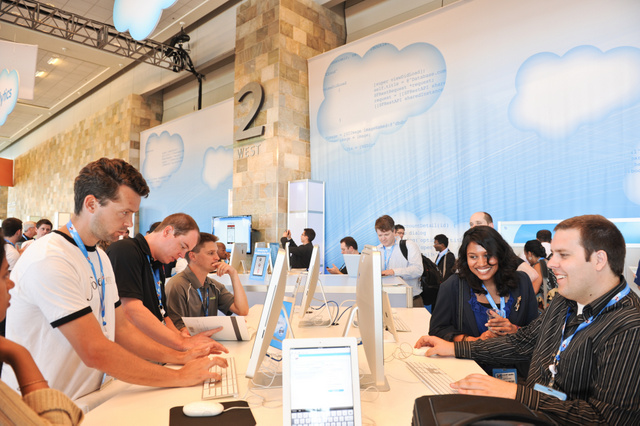I was new to Salesforce when I attended Dreamforce last year. Had been there just a few weeks. It was overwhelming. Sure, it was big. 40,000 people is a human swell. But what really surprised me was that they were having fun. I worked next to Moscone in the Westfield center for years. The big trade shows would come to town and masses of badged and suited attendees would wander their way in and out of Moscone to the Union Square hotels. They were dying to get out of there, into some comfy shoes and a beer at the hotel bar.
Dreamforce wasn’t like that. People were high-fiving. They were dancing. They were passionate. They were seeing friends and collaborators. DJs were playing. There were some odd dancing things. It felt like a big theme park.
So I get into the Developer Zone, out on the mezzanine of Moscone West. This space looks small on paper, but it’s actually tens of thousands of square feet. There are some big fire lanes to deal with, but there is tons of room for trade show stuff. And then the attendees came. It was a crush. I can’t quite describe what it’s like to be standing at your little demo station when 7500 people pile in. And then they stay. They have questions, they want to learn, they want to get in to the technology and even get hands on.
And I watched the attendees – as they grouped up, talked to each other, compared notes, picked sessions together, went off to get a coffee. I’ve been to a lot of PDCs and other conferences over the years. This felt different. That community feeling was there, instead of cattle getting the pitch.
So all of this was inspiration to me as we planned the developer experience for DF12. How could we amp up the community? How could we make it more hands-on? How could we cater it to the personalized interests of attendees? How do we do a massive developer conference but give it the feel of a smaller community event? How do we make it, quite simply, not lame.
So, here’s what we’ve done. First, we made it 3X bigger. Second, we made it all about getting hands on code. Finally, we centered on community and made it all about you. We rearranged Moscone West in what I think is a pretty clever way – devs are going to want to move in on the second floor. Our dev zone is now triple the size, with 20 partners, 3 theaters, plus the rows of session rooms. This means the floor basically only has developer content on it, and developer content isn’t running anywhere else. Bring comfy shoes, a laptop and maybe a sleeping bag, you aren’t going to want to leave.
Hands on code is a concept I’m passionate about. People look at me a little funny when I talk about it at first. Here’s the deal. When I look at sessions stats, the more code we show, the higher the session is ranked. If a session format includes a hands-on component, it scores thru the roof and it sells out instantly. So basically what we did was tell every presenter they had to have code in their session, and it needs to be downloadable or on GitHub. If you don’t have code, you don’t present. We do dry runs. If you are 20 minutes in dorking around in PPT with no code? You are done. We pull you. The PMs first thought we were kidding and then really got down with it. 230 sessions with code.
Then we took the same concept to the Developer Zone. Instead of trade show booths, we built the dev zone around places you can sit down, see a deep demo, then try it yourself with you laptop, Force.com and Heroku. Mini-workshops combine a quick 5 minute intro and then a guided, proctored path thru a dev task.
We wanted the community to feel like it’s their own event. It is amazing to see what happens when deeply knowledgeable, passionate people talk about technology they love and problems they care about. We ran a CFP and have around 100 sessions from the community. We have carved out a huge unconference space. Be sure to check it out, submit a session, vote. Some of these have more than a hundred votes.
Salesforce developer community – this is your year. See you at Dreamforce and peace out.
Adam
@adamse
